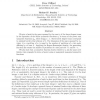Free Online Productivity Tools
i2Speak
i2Symbol
i2OCR
iTex2Img
iWeb2Print
iWeb2Shot
i2Type
iPdf2Split
iPdf2Merge
i2Bopomofo
i2Arabic
i2Style
i2Image
i2PDF
iLatex2Rtf
Sci2ools
COMBINATORICS
2004
2004
Bottom Schur Functions
We give a basis for the space spanned by the sum ^s of the lowest degree terms in the expansion of the Schur symmetric functions s in terms of the power sum
Related Content
| Added | 17 Dec 2010 |
| Updated | 17 Dec 2010 |
| Type | Journal |
| Year | 2004 |
| Where | COMBINATORICS |
| Authors | Peter Clifford, Richard P. Stanley |
Comments (0)

